I had the 2017 Reykjavik Open in my sights for a couple of months. After earning my final IM norm back in November and immediately tanking at the 2016 North American Open in December, I took a much-needed break away from competitive chess to re-evaluate where I was at and ask myself some tough questions. Did I still want to put in the immense time and effort to pursue the grandmaster title? Well yes, yes I did. OK maybe it wasn’t too difficult to answer the question. But as I started to ponder over which tournaments I should play to take my chess to the next level, everything about the upcoming Reykjavik Open just seemed to fit—the timing was good, the field was incredible, with stars like Anish Giri, Baduur Jobava, Alexei Shirov, Alexander Beliavsky (!) among others, and the fact that it’s become cheaper to fly to Iceland than ever before really cinched it for me, not to mention the large number of Americans that play in the event every year.
So it was settled, and joining me this time would be CM Isaac Steincamp, who actually reached out to me last year after reading my article about my 2016 Chess EuroTrip. To put it mildly let’s just say I inspired Isaac to take a semester off from his studies at the University of Pittsburgh and engineer his own incredible EuroTrip. As fate would have it, Isaac and Tom Riccardi (my travel mate from last year) are now teammates at Pittsburgh! Isaac’s trip, which started in February this year, included travels to play in tournaments all over Europe, ending in Reykjavik. In total he gained 186 FIDE (!) rating points, which is mostly a testament to the fact that he was greatly underrated going into the trip, but still, what an achievement! Unlike last year, this time I was just traveling for the one event, and as luck would have it it turned out to be the best performance of my career: 7.5/10 with a 2505 performance rating, which was good for the Top U2400 prize, as well as shared 6-10th place overall! Not bad considering I was about the 60th seed going in! Anish Giri took down the top prize with a blistering 8.5/10.
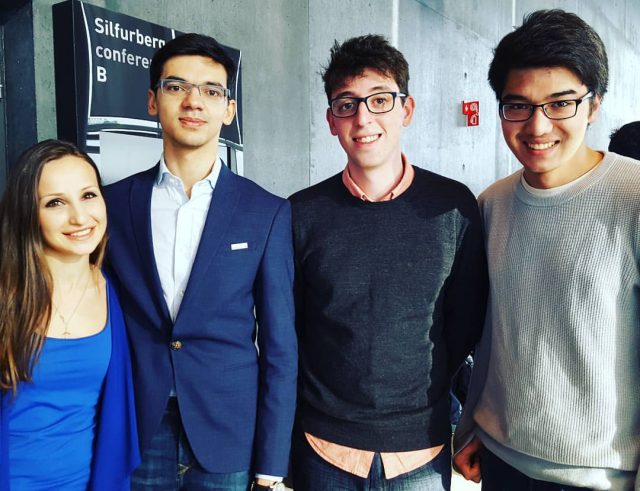 Isaac and I were big fan boys and snagged a photo with Anish + Sopiko at the closing ceremony!
Isaac and I were big fan boys and snagged a photo with Anish + Sopiko at the closing ceremony!Well, here’s how it all went down: The Reykjavik Open is a 10-round swiss that took place from April 19-27. It’s a very enjoyable tournament, one of the main reasons being it takes place at a pace of one round a day! The best part about that is that you have time to actually enjoy the chess. You get ample time to prepare for the round, then you play, and then when you’re done, there’s no second round to rush off to rest/prepare for. You have the evening off to go over the game with your opponent and conduct a proper post-mortem. The playing hall was located at the gorgeous Harpa concert hall, really one of the most beautiful playing venues one could imagine. The skittles area was located next to the in-house restaurant, and it wasn’t unusual to see 2700s enjoying a beer while analyzing their game. Honestly, I was not expecting to do well in the event. Having not played serious chess for a few months I expected to be rusty, and I did feel like I had to re-learn how to play, so to speak. Ultimately my only “goal” was to enjoy the game/trip as much as possible. I also came up with an interesting project for the tournament—having recently started a YouTube channel and wanting to create content for it, I decided to record an unfettered post-mortem of each one of my games, round by round. Unfettered in the sense that I would discuss my candid (sometimes very candid) thoughts on the game without first running the game through an engine or checking the opening database. Thus, the viewer could get my untarnished thoughts on the actual struggle, the critical moments, where I thought I went wrong or right, without the consistent caveat of “oh by the way, Stockfish actually says this”. Apart from creating what I thought would be an engaging concept, I also felt like it would be really great for my chess to critique my own games without Stockfish butting in every two seconds and ruining the fun. I pitched the idea to Isaac, who in his spare time runs Chess^Summit, a great site for improving players, and he instantly suggested a collaboration, wanting to join me in the game analysis. The show was born! Every night after our games were finished, we’d go back to our rented AirBnb and record the video. We took turns presenting our game and often discussed different variations based on our initial impressions. At the risk of sounding arrogant, the videos turned out to be incredibly instructive. Then we had to deal with the task of trying to get the word out about our video. Often this felt more challenging than the chess itself ?. We’d start off by posting on our respective Facebook and Twitter accounts. Then we’d share/retweet from other social media accounts that we are in charge of, as well as sharing each other’s links. Then we’d put up a link on Reddit with some kind of click-baity title, like “IM Kostya Destroys The London System In 30 Moves”. It was kind of exhausting, I have to say. But the response was good! Those who watched the videos enjoyed them, for the most part. At one point we decided it’d be fun to record a little tour of the event, to show our fans some behind the scenes of all the action. Here it is: https://www.youtube.com/watch?v=1_AxMM1eWlA Now on to the actual tournament! My first half was unsurprising in terms of the result and my quality of play. I won my first two games playing down, though not without some struggle. Then in Round 3 I lost to GM Josh Friedel without even knowing where I went wrong. It was a bit surreal, actually. My post-mortem with him was invaluable…it essentially turned into a private lesson about the game we had just played, as I really had no clue what was going on. I’ll present the game here without annotations; try to guess where Black went wrong, and then you’ll need to watch the video for the answer! (I’m getting better at this internet marketing thing).
[pgn][Event "2017 Reykjavik Open"] [Site "?"] [Date "2017.04.20"] [Round "3"] [White "Friedel, Joshua"] [Black "Kavutskiy, Kostya"] [Result "1-0"] [ECO "E62"] [WhiteElo "2524"] [BlackElo "2347"] [PlyCount "75"] [EventDate "2017.??.??"] [SourceDate "2015.04.04"]1. d4 Nf6 2. c4 g6 3. g3 Bg7 4. Bg2 O-O 5. Nc3 d6 6. Nf3 Nc6 7. O-O Bf5 8. Ne1 Bd7 9. e3 e5 10. d5 Ne7 11. e4 Ne8 12. Nd3 f5 13. Bg5 h6 14. Bxe7 Qxe7 15. f4 fxe4 16. Nxe4 Bf5 17. Qe2 exf4 18. Nxf4 Bd4+ 19. Kh1 Ng7 20. Rae1 Rae8 21. Qd2 Be5 22. Nd3 Bxe4 23. Rxf8+ Qxf8 24. Rxe4 Nf5 25. Qe2 Qf6 26. b4 b6 27. Bh3 Re7 28. Bxf5 Qxf5 29. b5 Kg7 30. Kg2 h5 31. Nf4 Rf7 32. Ne6+ Kg8 33. h4 Qf6 34. Re3 Qf5 35. Ra3 Qg4 36. Qxg4 hxg4 37. Rxa7 Rf3 38. Ra8+ 1-0[/pgn]https://www.youtube.com/watch?v=xVzTvqDAfkw This turned out to be our longest video yet, which goes to show that we practice what we preach to our students: you learn more from your losses!! Thankfully, my mood was not spoiled one bit to lose the game as I did—I knew I would learn a lot from it.
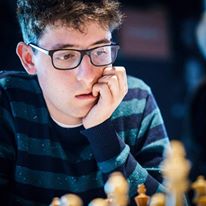 Round 5. Right before I got brutally checkmated! Photo: Lennart Ootes
Round 5. Right before I got brutally checkmated! Photo: Lennart OotesI bounced back with a topsy-turvy win in Round 4 and then in Round 5 I faced GM Helgi Dam Ziska, the strongest player of the Faroe Islands. While the loss to Josh was purely strategic, this one was painfully dynamic. I badly misplayed a Sicilian and got wrecked (as the kids say) with a thematic Nd5 sacrifice:
[pgn][Event "2017 Reykjavik Open"] [Site "?"] [Date "2017.04.22"] [Round "4"] [White "Ziska, Helgi Dam"] [Black "Kavutskiy, Kostya"] [Result "1-0"] [ECO "B40"] [WhiteElo "2553"] [BlackElo "2347"] [PlyCount "47"] [EventDate "2017.??.??"] [SourceDate "2015.04.04"]1. e4 c5 2. Nf3 e6 3. b3 b6 4. d4 cxd4 5. Nxd4 d6 6. Nc3 Nf6 7. Bb2 Be7 8. Qe2 a6 9. g4 Bb7 10. g5 Nfd7 11. h4 Nc6 12. Nxc6 Bxc6 13. O-O-O b5 14. Nd5 exd5 15. exd5 Bb7 16. Bxg7 Rg8 17. Bb2 Nb6 18. Qe4 Qc7 19. Bh3 Kf8 20. Rhe1 Re8 21. f4 Rg6 22. h5 Rg8 23. Qxh7 Nxd5 24. Qh6+ 1-0[/pgn]Check out my unfiltered thoughts on the game here! At half-time my tournament took a dramatic upswing, as I finished with 4.5 out of my remaining five! I won in Round 6 and Round 7 with real ease and a real sound quality of play in these games, which would give me another crack at a GM in Round 8: GM Magesh Panchanathan, a friend who has been living in the U.S. for many years now. After some tough defense on my end we ended up drawing in a really interesting endgame.
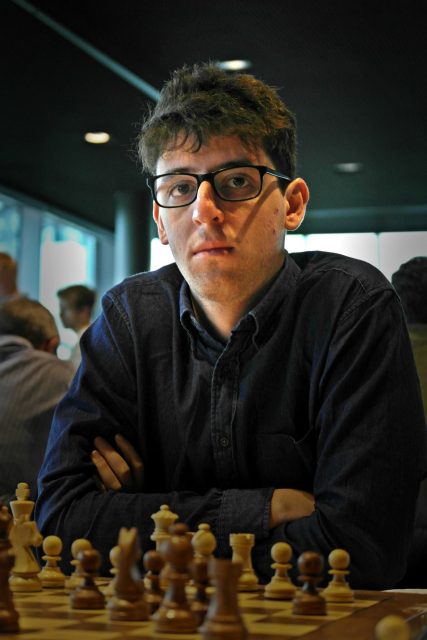 Round 8. It wasn't my turn so I looked at the camera. People say I look intense? Photo: Fiona Steil-Antoni
Round 8. It wasn't my turn so I looked at the camera. People say I look intense? Photo: Fiona Steil-AntoniIn Round 9, I was paired with IM Gudmundur Kjartansson of Iceland, actually another friend. While preparing my usual King’s Indian I saw that he had a number of games in the ultra-sharp Mar Del Plata variation in the Classical Main Line. You know, the line where Nakamura has beat down almost every top d4-player: Kramnik, Anand, Gelfand, and So, among others. Having never played it before, I felt it would be a good surprise for this game as I could prepare it quite deeply. My opponent made a bad decision to not deviate from his usual line, which was quite fortunate as I got a dream position from the opening and went on to win a lovely King’s Indian in style. Here’s my full analysis, including a detailed review of my prep:
[pgn][Event "2017 Reykjavik Open"] [Site "?"] [Date "2017.04.26"] [Round "9"] [White "Kjartansson, Gudmundur"] [Black "Kavutskiy, Kostya"] [Result "0-1"] [ECO "E99"] [WhiteElo "2468"] [BlackElo "2347"] [Annotator "Kavutskiy,Kostya"] [PlyCount "62"] [EventDate "2017.??.??"] [SourceDate "2015.04.04"]1. d4 Nf6 2. c4 g6 3. Nc3 Bg7 4. e4 d6 5. Nf3 O-O 6. Be2 e5 7. O-O Nc6 {Played with a muttered "yolo" under my breath.} 8. d5 Ne7 9. Ne1 (9. b4 {is the famous Bayonet Attack, popularized by Kramnik in the 90s.}) 9... Nd7 10. Be3 ( 10. Nd3 f5 11. f3 f4 12. Bd2 {is also very popular these days.}) 10... f5 11. f3 f4 12. Bf2 g5 13. Nd3 Ng6 14. c5 Nf6 15. Rc1 Rf7 16. Kh1 h5 {All the moves so far follow well known paths. White aims to break apart the queenside, while Black tries to give mate. It's a fun position that even the strongest computers struggle to analyze!} 17. Nb5 {A good move-order by White.} ({One of the best games of 2015 continued} 17. cxd6 cxd6 18. Nb5 a6 19. Na3 b5 20. Rc6 g4 21. Qc2 Qf8 22. Rc1 Bd7 23. Rc7 Bh6 24. Be1 h4 25. fxg4 f3 $1 26. gxf3 Nxe4 $3 27. Rd1 Rxf3 $1 $19 {and Hikaru went on to win in beautiful style in So-Nakamura, Sinquefield Cup 2015.}) 17... g4 ({The difference is that after} 17... a6 18. Na3 {the knight threatens to come to c4, and Black cannot play b5 here.}) 18. cxd6 cxd6 19. Qc2 $5 {This is the latest wrinkle and the main line of what I was expecting.} (19. Nxa7 Bd7 20. Qb3 g3 21. Bb6 Qe8 {took place in Merry-Hebden, St Clement Bay 2016, where Black had decent play.}) 19... Ne8 ({ The thematic} 19... g3 $6 {is bad in view of} 20. Nc7 $1 {which was seen in the following ideal game:} Rxc7 21. Qxc7 Qxc7 22. Rxc7 gxf2 23. Rfc1 {Black has two pieces for the rook but with the queens off the board, the minors on the kingside are really passive.} Bd7 24. Rxb7 Bc8 25. Rbc7 Bd7 26. Nxf2 Nf8 27. Rb7 Ne8 28. Bb5 Bxb5 29. Rxb5 $18 {Shirov-Bacrot, Bilbao 2014.}) 20. Nxa7 Bd7 {Black argues that the a-pawn is inconsequential. My plan is to play g3 and try to open the kingside.} 21. Qb3 g3 22. Bg1 Bf8 $1 {The first new move of the game, found about a week before the Reykjavik Open. There was no special method to finding this move, I left Stockfish on for a couple minutes and it came up with this move as best! The idea (I presume) is to swing the rook to g7 or h7, which is very useful for Black's attack.} ({The previous game to reach this point continued} 22... Bh3 23. Ne1 $1 Bxg2+ 24. Nxg2 h4 { and Black just didn't have enough in Batchuluun-El Jawich, Abu Dhabi 2016.}) 23. Rfd1 {Although the computer gives an evaluation of 0.00 with best play, the position is very difficult for White to play, as it's not clear how to deal with Black's plan of h4-h3.} (23. Qxb7 {loses to} Bh3 $1 $19) (23. Ne1 $1 {is probably best. But I cannot give away any more prep I'm sorry!}) 23... gxh2 24. Bf2 h4 {At this point I'm on my own, but the position is easy for Black, just push Harry the h-pawn and open lines!} 25. Kxh2 Qg5 26. Qxb7 $2 {This loses, but again, I cannot stress enough how tough the position is for White.} (26. Rg1 {was best, where Black has some options, such as} Nf6 ({or} 26... Rxa7 27. Bxa7 Qg3+ 28. Kh1 h3 29. Bf2 hxg2+ 30. Rxg2 Rh7+ 31. Kg1 Qh3 {gives Black a strong attack.Stockfish gives 0.08 for White, whatever that means.}) 27. Qxb7 Nh5 28. Qxa8 Ng3 $13 {ensnaring White's king, followed by Rh7 and h4-h3.}) 26... h3 $1 (26... Bh3 $2 {would allow White to bail out with} 27. Qxf7+ Kxf7 28. gxh3 {and Black has nothing better than to force a draw with} Rxa7 29. Bxa7 Qg3+ 30. Kh1 Qxh3+ 31. Kg1 Qg3+ 32. Kh1 Qh3+ $11) 27. g4 {The best try. Everything else loses in a direct way.} (27. Rg1 hxg2 28. Rxg2 Rh7+ 29. Kg1 Qh5 $19) (27. gxh3 Bxh3 28. Qxf7+ Kxf7 29. Kxh3 Rxa7 $1 $19) 27... fxg3+ 28. Bxg3 Qe3 $1 {The only winning move, which needed to be seen before playing 25.Qg5. White's knight on a7 ends up being a dud.} 29. Qxa8 Qxe2+ 30. Nf2 Rxf3 $1 { Black has fully broken though and threatens to take on f2 and deliver mate. I have to confess I felt a bit like Naka here.} 31. Rf1 (31. Rg1 Rxg3 $1 32. Kxg3 Bh6 $19) 31... Rxg3 ({After} 31... Rxg3 {White resigned in view of inevitable mate:} 32. Kxg3 Qe3+ 33. Kh2 Qf4+ 34. Kh1 Qf3+ 35. Kh2 Qg2#) 0-1[/pgn]
This put me in a great spot going into Round 10, I had 6.5/9 and was paired with IM Burak Firat of Turkey, who’s about 2500 FIDE. A positive result in this game would secure a huge rating gain and a prize. I showed up to the round a few minutes late, at which point Isaac greeted me at the entrance and broke the wonderful news: my game from Round 9 had won the Brilliancy Prize! This was a prize awarded by the organizers to the best game of each round. I was truly shocked, both Giri and Shirov also won fantastic games on the previous day, so it was quite humbling to say the least. My last round game was quite dramatic. I felt worse from the opening but my opponent overextended on the clock, spending too much time looking for a way to unbalance the game. In his time trouble, I seized my chance and forced an error to win a fine endgame: [pgn][Event "2017 Reykjavik Open"] [Site "?"] [Date "2017.04.27"] [Round "10"] [White "Kavutskiy, Kostya"] [Black "Firat, Burak"] [Result "1-0"] [ECO "E15"] [WhiteElo "2347"] [BlackElo "2503"] [Annotator "Kavutskiy,Kostya"] [PlyCount "95"] [EventDate "2017.??.??"] [SourceDate "2015.04.04"]1. d4 Nf6 2. c4 e6 3. Nf3 b6 4. g3 Ba6 5. b3 c6 6. Bg2 Bb4+ 7. Bd2 Be7 8. O-O O-O 9. Bc3 d5 10. Ne5 Nfd7 11. Nxd7 Nxd7 12. Nd2 b5 13. Re1 bxc4 14. bxc4 Nb6 15. c5 Nc4 16. Rb1 Qc7 17. e4 Rab8 18. exd5 exd5 19. Nf3 Rbe8 20. Bf1 Bf6 21. Ne5 Bxe5 22. dxe5 Qc8 {Around this point Black had little time, so I decided to take a risk and seize my chance.} 23. Qh5 $1 Na3 24. Bh3 Qc7 25. e6 $5 {A nice move to play against someone's time-pressure, but objectively not best.} ( 25. Rb4 $1 {was the way, and after} Nc4 (25... Nc2 26. Rh4 h6 27. e6 Nxe1 28. Bxg7 $1 $18 {wins for White}) 26. e6 f6 27. Bf1 $1 Re7 28. Bd3 g6 29. Qh4 { White has a near decisive attack.}) 25... fxe6 ({Just snagging the rook} 25... Nxb1 {was best. I was going to figure out my options here but White doesn't have anything better than to force a draw with} 26. Bxg7 Kxg7 27. Qg5+ Kh8 28. Qf6+ Kg8 29. Qg5+ $11) ({I was hoping for} 25... f6 26. Rbd1 ({Apparently} 26. e7 $1 {is much stronger, according to my annoying know-it-all silicon friend:} Rxe7 27. Rxe7 Qxe7 28. Re1 Qc7 29. Be6+ Kh8 30. Bf5 g6 31. Bxg6 $18) 26... Nc2 $2 27. Bf5 $1 g6 28. Bxg6 hxg6 29. Qxg6+ Qg7 30. Qxc2 $18) 26. Rxe6 Qf7 (26... Nxb1 {doesn't work in view of} 27. Rxe8 Nxc3 28. Be6+ Kh8 29. Rxf8#) 27. Qxf7+ Kxf7 28. Rbe1 {White is clearly better in this endgame thanks to the two bishops.} Rxe6 $6 {The decisive mistake.} 29. Bxe6+ Kg6 30. Bxd5 $1 cxd5 31. Re6+ Kf5 32. Rxa6 Nc2 33. Rd6 Ke4 34. c6 Nd4 (34... d4 35. c7 $1 dxc3 (35... Rc8 36. Ba5 $18) 36. Rd8 $18) 35. Bxd4 ({Although I love how the endgame turned out,} 35. c7 {was a much easier win:} Rc8 36. Ba5 Nb5 37. Rd8 Rxc7 38. Bxc7 Nxc7 39. Rd7 Ne6 40. Rxa7 $18) 35... Kxd4 36. c7 Rc8 37. Rc6 {Rook behind the passed pawn! For a full analysis of this endgame, check out the YouTube recap, it's really quite interesting stuff I promise :).} (37. Rd7 {also wins, but I feel my way gives Black less counterplay.}) 37... g5 38. Kf1 Kd3 39. Ke1 h5 40. Kd1 h4 41. g4 {At this point I was 100% confident of the win, as Black's king will eventually have to give ground, due to zugzwang.} d4 42. Rc5 Ke4 43. Ke2 d3+ 44. Kd2 h3 45. f3+ $1 Kxf3 46. Kxd3 Kxg4 (46... Kg2 47. Rc2+ Kg1 48. Ke4 $18 {and Black is just lost.}) 47. Ke4 a5 48. a4 {Black resigned as the situation is hopeless.} ({After} 48. a4 Kh4 49. Ke5 g4 50. Kd6 {Black doesn't get enough play:} g3 51. Rc4+ Kg5 52. hxg3 h2 53. Rh4 $18) 1-0[/pgn]
 6th to 10th places! Kostya, standing next to GMs Nils Grandelius, Zoltan Almasi, Erik & Blomqvist. Photo: Lennart Ootes
6th to 10th places! Kostya, standing next to GMs Nils Grandelius, Zoltan Almasi, Erik & Blomqvist. Photo: Lennart OotesAnd that was that! After I won, I couldn’t believe what I had done! 7.5/10 in one of the biggest opens in the world? I was just as shocked as everyone else! The closing was a blast, it was my first time receiving a prize in a European tournament, with all the fanfare, roses, handshakes and all, and, since I had earned 6th place along with Top U2400 honors, I ended up receiving two prizes, and two roses! So that was pretty sweet, not gonna lie ?. The congratulations and questions of a GM norm started pouring in on Facebook, but with just a 2505 performance, of course, I was quite far away from that coveted 2600.
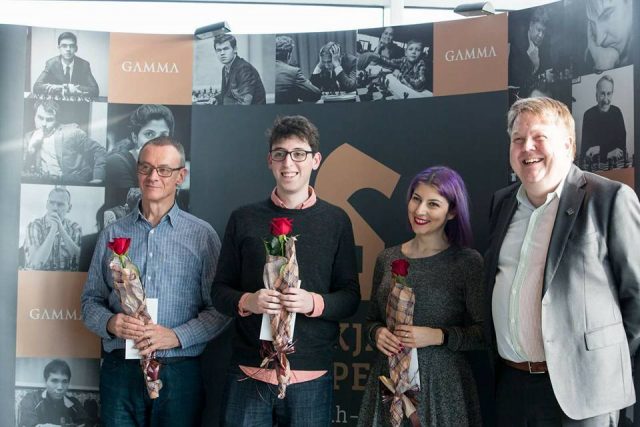 Top U2400! (L to R: John Pigott, Kostya Kavutskiy, Tatev Abrahamyan, & Tournament Organizer Gunnar Bjornsson) Photo: Maria Emilianova
Top U2400! (L to R: John Pigott, Kostya Kavutskiy, Tatev Abrahamyan, & Tournament Organizer Gunnar Bjornsson) Photo: Maria EmilianovaLooking back on the tournament, I realize that I was in a really great mindset for most of my games and didn’t make any huge blunders overall. I stayed objective and made good, practical decisions. Now, I get to play the game of trying to figure out what went right for me in this tournament, so that I can try to recreate it for future events. Well, until next time, cheers!
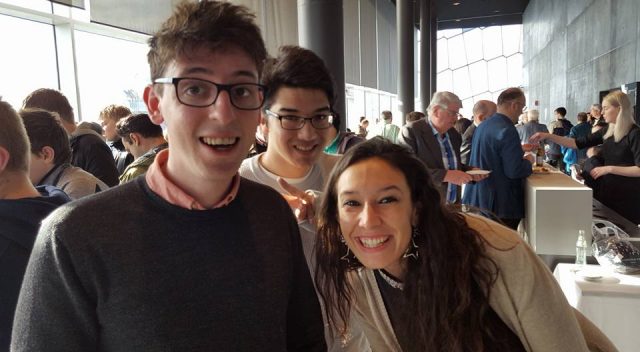 With Isaac & Fiona Steil-Antoni from the closing ceremony.
With Isaac & Fiona Steil-Antoni from the closing ceremony.IM Kostya Kavutskiy is a professional chess author, player, and coach currently residing in Mountain View, CA. To connect with Kostya, check out his website, Twitter, Facebook, and YouTube.
Categories
Archives
- December 2025 (27)
- November 2025 (29)
- October 2025 (39)
- September 2025 (27)
- August 2025 (29)
- July 2025 (43)
- June 2025 (25)
- May 2025 (24)
- April 2025 (29)
- March 2025 (29)
- February 2025 (20)
- January 2025 (24)
- December 2024 (34)
- November 2024 (18)
- October 2024 (35)
- September 2024 (23)
- August 2024 (27)
- July 2024 (44)
- June 2024 (27)
- May 2024 (31)
- April 2024 (51)
- March 2024 (34)
- February 2024 (25)
- January 2024 (26)
- December 2023 (29)
- November 2023 (26)
- October 2023 (37)
- September 2023 (27)
- August 2023 (37)
- July 2023 (47)
- June 2023 (33)
- May 2023 (37)
- April 2023 (45)
- March 2023 (37)
- February 2023 (28)
- January 2023 (31)
- December 2022 (23)
- November 2022 (32)
- October 2022 (31)
- September 2022 (19)
- August 2022 (39)
- July 2022 (32)
- June 2022 (35)
- May 2022 (21)
- April 2022 (31)
- March 2022 (33)
- February 2022 (21)
- January 2022 (27)
- December 2021 (36)
- November 2021 (34)
- October 2021 (25)
- September 2021 (25)
- August 2021 (41)
- July 2021 (36)
- June 2021 (29)
- May 2021 (29)
- April 2021 (31)
- March 2021 (33)
- February 2021 (28)
- January 2021 (29)
- December 2020 (38)
- November 2020 (40)
- October 2020 (41)
- September 2020 (35)
- August 2020 (38)
- July 2020 (36)
- June 2020 (46)
- May 2020 (42)
- April 2020 (37)
- March 2020 (60)
- February 2020 (38)
- January 2020 (45)
- December 2019 (34)
- November 2019 (35)
- October 2019 (42)
- September 2019 (45)
- August 2019 (56)
- July 2019 (44)
- June 2019 (35)
- May 2019 (40)
- April 2019 (48)
- March 2019 (61)
- February 2019 (39)
- January 2019 (30)
- December 2018 (29)
- November 2018 (51)
- October 2018 (45)
- September 2018 (29)
- August 2018 (49)
- July 2018 (35)
- June 2018 (31)
- May 2018 (39)
- April 2018 (31)
- March 2018 (26)
- February 2018 (33)
- January 2018 (30)
- December 2017 (26)
- November 2017 (24)
- October 2017 (30)
- September 2017 (30)
- August 2017 (31)
- July 2017 (28)
- June 2017 (32)
- May 2017 (26)
- April 2017 (37)
- March 2017 (28)
- February 2017 (30)
- January 2017 (27)
- December 2016 (29)
- November 2016 (24)
- October 2016 (32)
- September 2016 (31)
- August 2016 (27)
- July 2016 (24)
- June 2016 (26)
- May 2016 (19)
- April 2016 (30)
- March 2016 (36)
- February 2016 (28)
- January 2016 (32)
- December 2015 (26)
- November 2015 (23)
- October 2015 (16)
- September 2015 (28)
- August 2015 (28)
- July 2015 (6)
- June 2015 (1)
- May 2015 (2)
- April 2015 (1)
- February 2015 (3)
- January 2015 (1)
- December 2014 (1)
- July 2010 (1)
- October 1991 (1)
- August 1989 (1)
- January 1988 (1)
- December 1983 (1)







